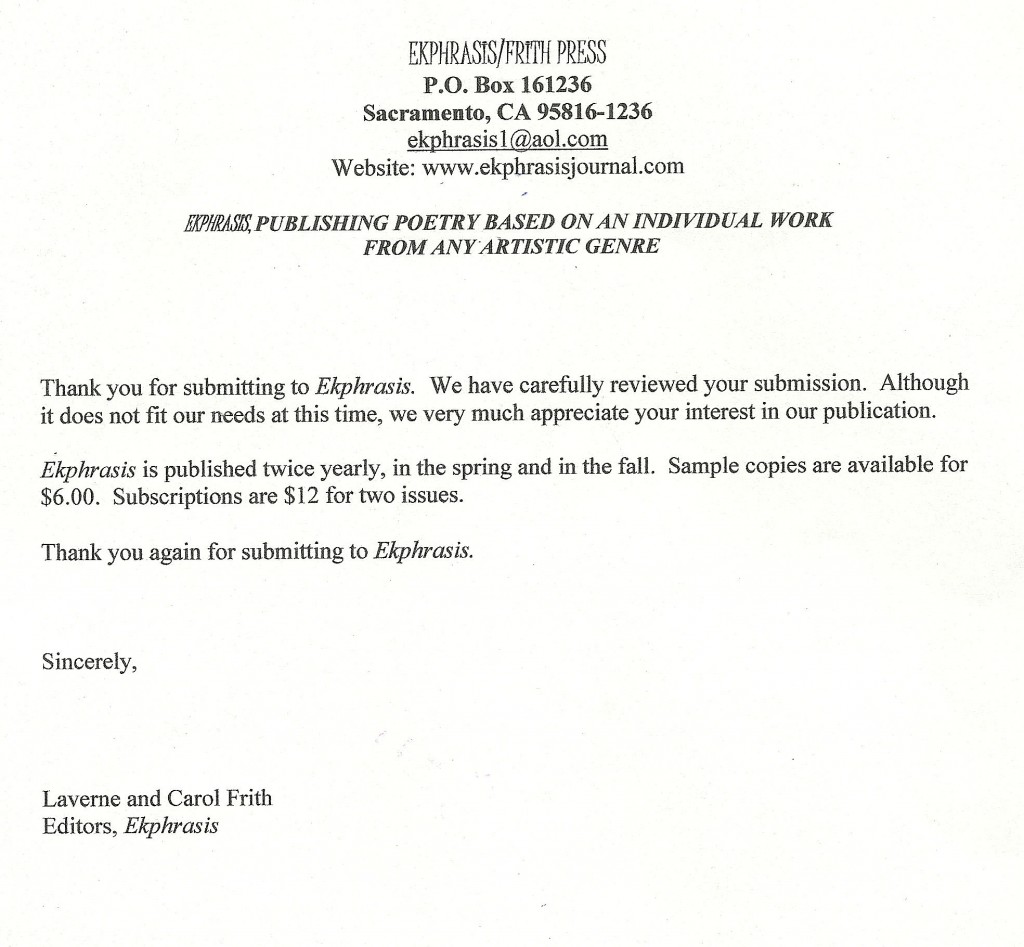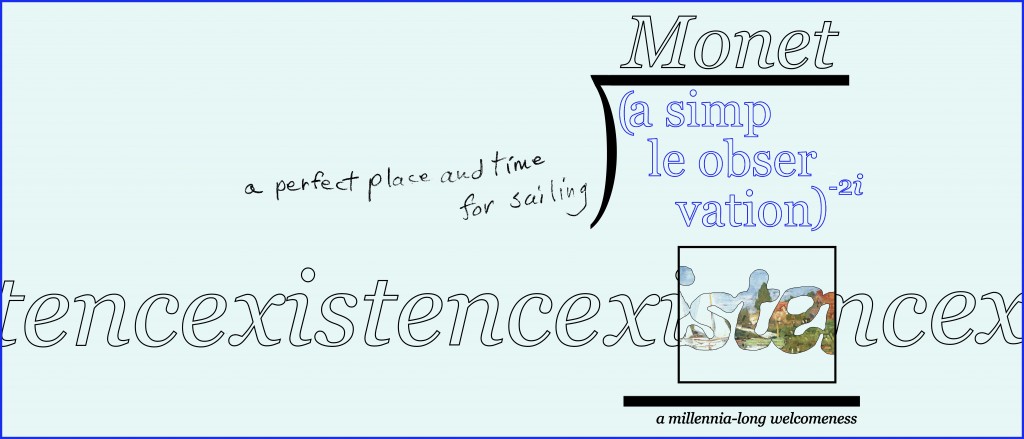Archive for the ‘Ekphrasis’ Category
Entry 968 — Another Form Rejection
Sunday, December 30th, 2012
I’m as petty as they come, but I have trouble letting mediocrities and sub-mediocrities with power in poetry or any other cultural field, however little, get away with dim-minded opposition to work in their field that is . . . different. Like my “An Arithmepoetic Analysis of Monet’s ‘The Regatta at Argenteuil,’ Frame 4″:
A week after I mailed it to Ekphrasis, I got it (and my cover letter and my business card) back with this:
 .
.
According to its website, “Ekphrasis is a poetry journal looking for well-crafted poems, the main content of which addresses individual works from any artistic genre. . . . Acceptable ekphrastic verse transcends mere description: it stands as transformative critical statement, an original gloss on the individual art piece it addresses.” Sorry, folks, but I really can’t see how my poem could be a more transformative critical statement than it is. I sincerely doubt that anything published in Ekphrasis is as much as a tenth as effectively transformative as it.
Am I over-reacting to a rejection? No. The editors may just not like Monet, or mathematics, or the like. What I am over-reacting to is their telling me they “carefully reviewed” my poem. I suspect they glanced at it, failed to recognize it as the sort of conventional crap the poetry establishment favors, and immediately put it in my SASE and sent it back to me. Or they actually spent more than a moment puzzling over it, and–at best–form-rejected it because too weak of character to write me a short note saying they couldn’t understand it. In other words, they tried to carefully review it but lacked the competence to do so. Actually, what they should have done, and I wonder if any editor of a poetry periodical with a circulation of more than a few hundred would ever think of doing, is written me to find out what the poem is doing. Could they possibly have failed to see that it may have been good if only they could understand it instead of certainly poor because they couldn’t understand it?
Here’s what the thing is doing which without question makes it a superior artwork (a masterpiece, as far as I’m concerned), unless I am without question a terribly feeble-minded sub-mediocrity: it makes the multiplication of a perfect place and time for sailing by Monet a metaphor for the creation of a window into everflowing existence that reveals the splendor of a moment of existence (the moment containing the ideal conditions for sailing), and the addition of a millennia-long welcomeness to what the window reveals a metaphor for a simple observation–to the power of minus two times i, the square root of minus one, which is imaginary, and does something very strange to the simple observation. (It makes it something outside normal reality, it makes it art.) Along the way, it contrasts a hand-written, conventionally-worded text that emphasizes the quotidian nature of sailing while at the same time suggesting the feeling of being bourne upward that sailing can produce due to the slant of the text’s lines with a formally-printed, italicized poetically-worded text about how Monet’s painting welcomes you into the window the poem shows it to open.)
Is my self-serving analysis invalid? I defy anyone in the poetry establishment to show me why.
Is it idiotic of me to waste time with a rant like this against a very trivial foe? I think not. It is natural to respond with either anger or sadness to rejection. As a mentally healthy male, I can’t avoid responding with anger, and anger, unlike sadness, compels one to action. Or smouldering frustration. Preferring the former, I have chosen this entry as my action. Which makes me feel good. But I believe it will make others constantly form-rejected by their inferiors, like I, feel vicariously pleased. Most important, it makes my position against the status quo public–or, more accurately, potentially public–i.e., out where it might be seen. If seen, there’s always the chance it will have some valuable effect, if only to get one of two innocent poetry people to discover how much larger the poetry world is than the poetry establishment wants them to know.
It gave me an excuse to critique my poem, and I love critiquing my poems more than making them. It was encouraging to find I was able to make a case in favor of my poem that seemed as good as it did to me. It made me feel good, too, for once again revealing myself as (very possibly) the only poet in the world telling the world why a poem of his is superior.
.
